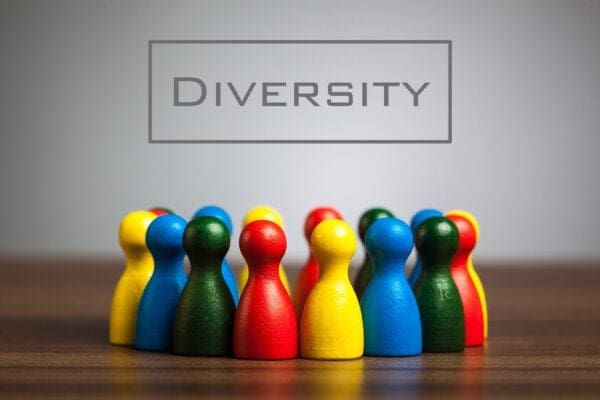Good Ethics Make Great Businesses
Ethics at work are more in the spotlight now than ever. Resilience in a tough economic climate can involve making hard choices to stay profitable and grow. Leaders and managers must also navigate diversity and inclusivity, alongside today’s other big challenge, embracing sustainability. And if that wasn’t enough, as people become choosier about employment, companies’ perceived values come under increasing scrutiny.
In this article, we explore the components of ethical and unethical work behaviour in their personal and corporate aspects. Individual workplaces’ ethics can be situational, reflecting the prevailing norms of the existing workgroup and its culture. But as this piece makes clear, the fundamentals remain constant.
Jump Menu:
- Why are Ethics Important?
- Unethical Workplace Behaviour
- Reporting Unethical Behaviour
- The Most Important Work Ethics
- The Ethics of Dealing with Challenging Behaviours
- The Principles and Codes of Professional Ethics
- Core Professional Ethics at Work
The Only Way is Ethics. But Which Way is Up?
Workplace ethics are the moral values businesses live by, that decide which actions are appropriate or otherwise. In some workgroups, people who are somehow different from the rest of the group can experience discrimination and bullying. That’s despite the Equality Act 2010, which sets the benchmark. The reality is, workplace ethics may reflect the prevailing norms of the workgroup, but not wider society. So, some leadership may be needed.
Why are Ethics Important?
Ethics take in every aspect of a business, from what companies do and how they’re run, to how individuals behave. As to what behaviour’s acceptable and what isn’t, attitudes change. What’s accepted in one community may not be in another. Also, workgroups, like groups generally, ‘socialise’ individuals and impose their norms and expectations. Our longing for attachment means we want to belong, not be outcast, so we comply. In our hearts, we may not want to go along with the group initially because we feel it’s wrong, but end up doing so.
Leaders and managers with diverse workforces need to appreciate different cultures’ customs and mindsets. And while we’re here, bosses of a certain age may stereotype younger employees as snowflakes or ‘woke.’ Such personal criticism isn’t only unethical, it’s upsetting. If you put people off working for you, they’ll leave. And you’ve lost valuable talent and expertise.

Leaders and line managers should also be self-aware about how new hires are likely to perceive them after the onboarding honeymoon. Will people still want to work for you when they see what you’re really like?
Unethical Workplace Behaviour is Unacceptable. You Need to Be Able to Recognise it
Experts define unethical workplace behaviour as any action at work that goes against the moral norms of the wider community. This can take multiple forms and have multiple targets. From minor to severe forms, people behaving unethically can hurt societies, organisations, colleagues, suppliers, customers, and even themselves. Many studies have been done, showing unethical behaviour at work is prevalent in many organisations throughout the world. And it’s also extremely costly, because of the damage it can do.
Unethical workplace behaviour can be intentional or unintentional. In intentional unethical behaviour, people know they’re crossing an ethical boundary and act purposely. People also sometimes behave unethically because they’re unaware they’re transgressing moral standards.
Sticky Learning ® is 7 times more effective than 1-day training courses. Plus, you will get a Chain of Evidence proving your Return on Investment. Discover soft skills training that changes behaviours long term.

Common Examples of Unethical Behaviour in The Workplace
The following examples are from the specialist website managinglifeatwork.com. They go into more depth, but this list should get you thinking:
- Misleading communications
- Fraudulent behaviour
- Anti-competitive activity
- Production deviance: In plain English, this means giving short measure: not doing your job or supplying goods or services properly, honestly, and fairly.
- Withdrawal: Not working as you’re supposed to in work time: presenteeism or absenteeism: feigning sickness: choosing not to help colleagues in need.
- Knowledge hiding: Pleading ignorance, or concealing knowledge: not speaking up against unfairness: concealing information.
- Property deviance: Theft, fiddling expenses and taxes: sabotage in some form: destroying or falsifying documents: deleting email trails.
- ‘Political’ deviance: favouritism: gossiping: badmouthing: networking to gain influence: bribery.
- Ostracising people: Excluding people from workplace social groups.
- Interpersonal deviance: Being unreasonable to colleagues and subordinates: blaming others for your failings.
- Aggression
- Bullying and mobbing
- Abusive leadership
- Drug and alcohol use/abuse
- Unsafe behaviour: Anything that puts people at risk.
This list shows how easy it is to behave unethically, and go with the flow. It’s one thing to be judgemental about companies or individuals whose ethical standards we think fall short. We also need to remember their ethics reflect the society they operate in, and the regulatory bodies and government.
20 More Unethical Workplace Behaviours
Like Mr Scrooge in A Christmas Carol, a boss displaying unethical behaviours can always change their ways when they realise. Here are some more examples:

- Making false claims in sales.
- Incomplete supply of agreed services.
- Financial irregularities.
- Paying suppliers late.
- Disregarding safety measures.
- No staff development and training.
- Lack of support for mental health and wellbeing.
- Micromanaging staff.
- Unfair employment terms.
- History of unfair dismissal cases.
- People regularly working long hours or taking work home.
- Poor communication.
- Lack of proper performance reviews.
- Blame culture.
- Sexism and racism.
- Homophobia.
- Unsafe premises.
- Substandard company vehicles.
- No commitment to sustainability.
- Alcohol abuse.
Reporting Unethical Behaviour
People talk a lot about employees calling out unacceptable behaviour. This can lead to a climate of high emotions and ongoing tension. In such instances, the first sensible step is to take a reality check. Be clear about the facts as you see them, and listen to colleagues’ suggestions about what to do. If someone’s crossed a boundary, they should be reprimanded and disciplined as appropriate.
For something that’s unacceptable on a larger scale, we live in an era of whistle-blowers. That’s one solution. But be mindful of what you could be getting into. The experts advise the following if you suspect unethical activity:
- Size it up: Is this an ethical issue, or simply something you don’t like? Make sure of the who, what, when, and the details.
- Start with the perpetrator: Where possible, begin by addressing your concerns with the person responsible. If that doesn’t work, escalate it, but keep yourself safe.
- Reporting lines: Who do you go to next? Is your boss implicated? In that case, where else can you go?
- Talking compliance: Is it a minor infraction, or is it illegal behaviour?
- Should I stay, or should I go: If the working environment is hostile to compliance and ethics, it might be best to leave.
- Culture club: If this is bad, what will the next place be like?
Turning Negative To Positive – What are The Most Important Work Ethics?
The rest of this piece takes a more positive tone, exploring ways to improve work ethics. Focusing on ethical behaviour allows you to develop people and make them more productive. It’s good for the bottom line. Here are some pointers to think about:
The 5 Most Important Work Ethics

HR plays an important part in ensuring companies hire people with good ethics. A Malaysian recruitment site lists these common work ethics. These characteristics are common to every culture:
- Integrity
- Honesty
- Discipline
- Fairness and respect
- Responsibility and accountability
It’s essential to recruit staff with good ethics, and keep them on track. Poor business ethics can tarnish your reputation. It’s not just public figures and celebs whose missteps come back to haunt them. People monitor companies and brands on social media, and past mistakes can easily resurface. If that happens to you, be honest, accept responsibility, and think positively. Maintaining a strong ethical culture is key in building trust among your workforce, and the credibility of your business.
10 Work Ethic Traits
Staying with personal work ethics, some common traits are important for career success. An American technical college expects the following characteristics from their students. Any employer would be happy to have team members with these attributes, though the last one on this list needs sensitivity:
- Attendance: Attends as required: arrives and leaves on time, gives notice of planned absences: and delivers assignments promptly.
- Attitude: Shows a positive attitude, appears confident and has realistic hopes and expectations.
- Communication: Displays proper verbal and non-verbal skills, and listens.
- Co-operation: Shows leadership, properly handles criticism, conflicts, and stress maintains proper relationships with peers, and follows the chain of command.
- Organisational skills: Displays skills in management, prioritising and dealing with change.
- Productivity: Follows safety practices, conserves resources, and follows instructions.
- Respect: Deals properly with diversity and shows understanding and tolerance.
- Teamwork: Respects the rights of others, is a team worker, helpful and confident, displays a customer service attitude, and seeks continuous learning.
- Appearance: Displays proper dress, grooming, hygiene, and manners.
As we said, this final attribute calls for sensitivity. Depending on the individual, enforcing particular dress and grooming codes in the workplace can be problematic. It can be seen as encroaching on people’s liberty and right to self-expression. But personal hygiene and good manners are still reasonable things for employers to expect.
The Top 10 Work Ethics

As suggested by an American training company, the following ethics characterise effective leaders, managers, and team members. As people gain experience and develop, this list becomes more applicable:
- Desire to Think: Not only has the ability to think critically but apply it. Sees the value of thinking things through, before making decisions and when resolving problems.
- Commitment: Being loyally oriented to the job, company goals and mission.
- Honesty: Respects other people’s property, follows rules, keeps promises, and tells the truth.
- Regard for safety: Values workplace safety rules and precautions for personal and co-worker safety. Avoids unnecessary risks.
- Professionalism: Takes an appropriate approach to social interactions at work. Maintains focus on work responsibilities.
- Motivated: Eagerly focuses energy on accomplishing tasks and demonstrates ownership.
- Tolerance: Respects diversity in the workplace, including showing due respect for different perspectives, opinions, and suggestions.
- Flexibility: Is resilient. Able to welcome and adapt to changing workplace situations, and apply different skills.
- Desire to learn: Willing to learn new processes, systems, and procedures in the light of changing responsibilities.
- Dependability: Motivated to complete assigned tasks well, taking pride in the accomplishment of work assignments.
Houston, We Have a Problem! The Ethics of Dealing with Challenging Behaviours
Companies will have clear rules for employees who behave unethically and cross a line. Whether giving a verbal warning, a written warning or dismissing them, you’re obliged to follow the proper procedures.
It’s more complicated with previously modelled employees who develop personal problems and become unable to meet the expected work ethic. In this instance, discipline isn’t appropriate. Leaders and managers should still behave ethically in ensuring they get the necessary help and support.
Some Examples of Good Ethics to Insist On
As we’ve seen, what constitutes good ethics can vary widely depending on businesses and individuals. Account handlers at different levels in a business can align extremely successfully with customers and suppliers, and achieve great results. These star performers are outstanding when they’re on a roll. But back in the workplace, their behaviour can be intentionally or unintentionally unethical.
Here’s a suggested list of reasonable expectations for star performers:
- Obeying the company’s rules
- Effective communication
- Time management
- Productivity
- Accountability
- Taking responsibility
- Professionalism
- Dedication
- Trust
- Mutual respect for colleagues
How Do You Show Your Work Ethic in the Job?

Here’s a checklist for wannabe high flyers. You’ll demonstrate a strong work ethic to your employer if you:
- Put the company first.
- Manage your time wisely.
- Be honest.
- Maintain a balanced and consistent performance in doing your work.
- Always show respect.
- Follow the rules.
- Work with others.
- Stay fit and healthy.
Taking it to the Next Level: The Principles and Codes of Professional Ethics
You don’t have to work in a profession to have professional ethics. These 5 principles from the American Psychological Association help psychologists and researchers follow an ethical path:
- Be upfront about intellectual property.
- Be aware of your influence and role
- Observe informed consent.
- Uphold confidentiality and privacy rights.
- Know and use ethical resources.
The Institute of Chartered Accountants for Scotland, refer to these 7 ‘golden ethical principles.’ Again, these are open to everyone:
- Be an ethical leader.
- Use moral courage.
- Consider the personal and professional reputation.
- Set the right tone at the top.
- Maintain an enquiring mindset.
- Consider the public interest.
- Consider ‘the right, the good, and the virtuous’ actions.
And Finally: The Work Ethic is Evolving, But the Core Professional Ethics at Work Remain Consistent
Our attitudes to work are evolving. Once people were admired for working flat out, to the point of burnout. Now, growing numbers are seeking a more fulfilling, healthy work-life balance and abandoning the old-school Protestant work ethic.
The Protestant work ethic is about diligence, punctuality, deferred gratification, and the primacy of the workplace. Effort is key. Like going to the gym and getting ripped, if it hurts, you’re achieving. But it’s ultimately not healthy, and people increasingly prefer not to live like this. They know their mental health will suffer without proper self-care, and want to enjoy life to the full.
As Vroom’s Expectancy Theory confirms, once people reach a certain level at work, money isn’t the only reward they seek. So, it’s good ethics to understand your team’s psychology and what they’re looking for in their employee experience. When it comes to doing the right thing in business, for leaders and managers these 8 professional ethics remain consistently important:
-
- Honesty
- Trustworthiness
- Transparency
- Accountability
- Confidentiality
- Objectivity
- Respect
- Obedience to the law
- Loyalty
This is the real world, and it’s changing all the time. Businesses have to learn to be proactive and expect the unexpected, and if it happens, be resilient. As the commercial environment changes and industries evolve, there will inevitably be challenges and hard decisions. But navigate them ethically, and you will attract and keep good people, who will develop and grow with you. And that can only be good for business.




